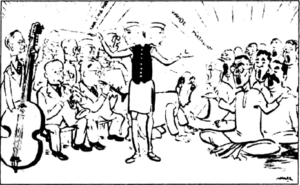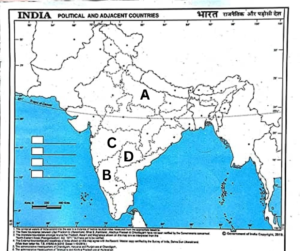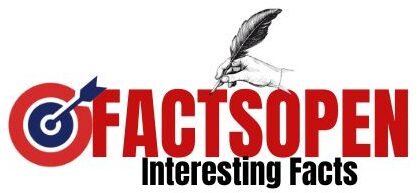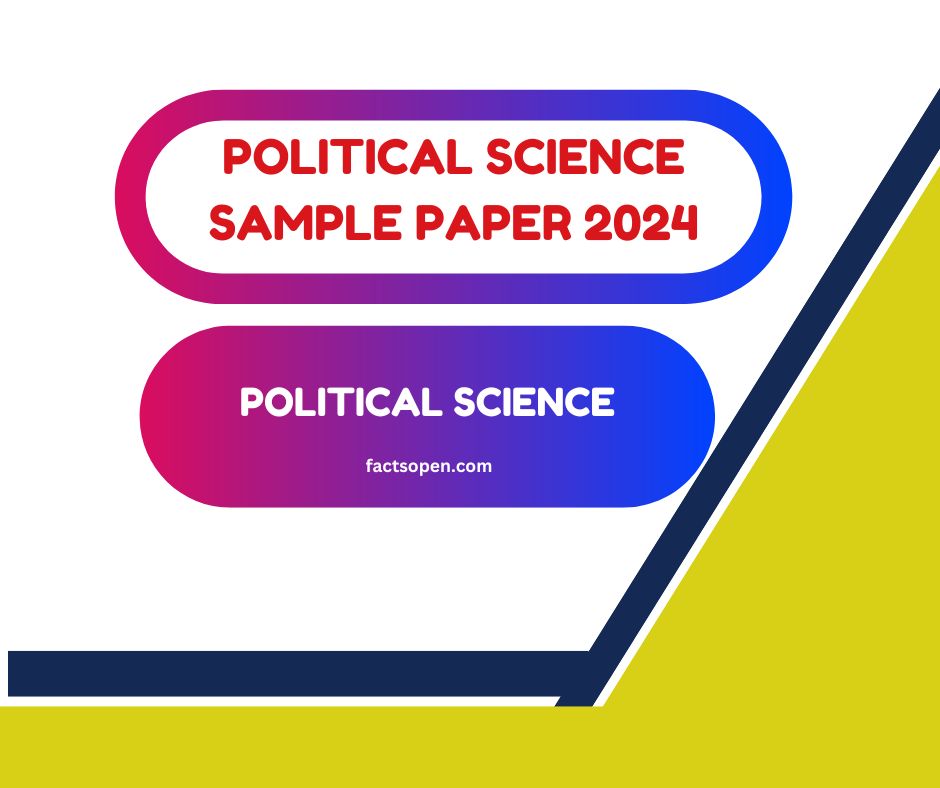Class 11 Political Science CBSE Sample Paper with Answers 2024
Question numbers 1-2 are case study based. Study them carefully and answer the questions based on this – 4
In the normal course of law, a person can go to court only if someone has suffered personal harm. This means that if a person gets caught in a dispute over violation of his rights, he can approach the court to get justice. This concept changed from 1979.
Beginning with this change in 1979, the Court decided to hear cases filed not by victims but by others on their behalf. Since in this case a case related to public interest was being considered, hence this and many other similar cases were named as public interest litigations.
Question: 1.1 who has the right to go to court in India under the ordinary course of law?
Is?
- only men
- only women
- only the youth
- to all Indian citizens
Answer: D. To all Indian citizens
Question: 1.2 PIL what is the correct full form of (PIL)?
- Private interest litigation
- Public Interest Litigation
- Private Intelligence Litigation
- Public Intelligence Litigation
Answer: B. Public Interest Litigation
Question: 1.3 PIL When is PIL considered to have started?
- 1950
- 1960
- 1970
- 1979
Answer- D. 1979
Question 1.4. S. A. l. What is the correct expanded form of (S.A.L)?
- Social interest litigation
- Social Action Litigation
- Social article litigation
- Social Advisory Litigation
Answer- B. Social Action Litigation
Question: 2. The Constitution of South Africa came into force in 1996. It was created and implemented when South Africa was facing the threat of civil war after the fall of the apartheid government. According to the Constitution of South Africa, its “Charter of Rights is the cornerstone of democracy in South Africa. It prohibits discrimination on the grounds of race, sex, religion, conscience, belief, culture, language and birth.” The Constitutional Court enforces. 4
2.1 When did the South African Constitution come into force?
- 1995
- 1996
- 1998
- 1999
Answer- B.1996
2.2 Which of the following is basically the basis of the Constitution of South Africa?
- Basis of republic
- Basis of democracy
- Basis of monarchy
- Basis of oligarchy
Answer- B. Basis of democracy
2.3 Probably the most comprehensive right in the world is-
- Brazilian citizens
- To the citizens of India
- To the citizens of South Africa
- Citizens of South Korea
Answer- C. To the citizens of South Africa
2.4 Which court has been created to enforce constitutional rights in South Africa?
- Supreme Court
- High Court
- Subordinate Courts
- Constitutional court
Answer- D. Constitutional Court
CBSE Sample paper: Social Justice: Important Notes
Question: 3. The Constitution decides who will make the laws. Who will have the right to make laws? The Constitution also limits the laws the government can enforce on its citizens.
A constitution is necessary for a civilized society. It is only through the Constitution that a society is recognized as a collective unit.
We create our basic political identity by agreeing on some basic rules and principles. 4
Question: 1 what is the relationship between the Constitution and law? 2
Answer: – Constitution and law are related to each other and it is decided by the Constitution who will make the law. The Constitution itself decides the limits of law.
Question: 2 what is meant by political identity of citizens? 2
Answer: – Any citizen becomes a citizen of any country because he believes in the basic rules and constitution of that country. Only after accepting all these, a person’s political identity is formed.
Question: 4. Look at the displayed cartoon carefully and answer the following questions – 4

Question 1. Who is the two faced person? 1
Answer: – Pandit Jawaharlal Nehru
Question 2. Which ideology do the members sitting on the right and left of the person belong to? 1
Answer: – People of western ideology and supporters of eastern i.e. Indian culture.
Question 3. What decision was taken to balance both the ideologies? 2
Answer:- To satisfy both, Jana-Gana-Mana was made the national anthem and Vande Mataram was made the national song.
Question No. – Selection of one correct option in multiple choice questions given from 5 to 11.
Do it. 7
Question 5. In which non-political area has politics not entered?
- Right to life
- Interference in domestic life
- Foreign travel
- Environmental area
Answer- A. Right to life
Question 6. How many schedules are there in the Constitution of India?
- 12
- 10
- 09
- 13
Answer- A. 12
Political Science Sample Paper Question
Question 7. Whose creation is ‘The Republic’?
(a) Aristotle
(b) Plato
(c) Machiavelli
(d) Bodan
Answer (b) Plato
Question 8. When was the voting age reduced from 21 years to 18 years?
- In 1982
- In 1998
- In 1999
- In 1989
Answer- D 1989
Question 9. What is politics?
- Politics is the art of governing.
- provides solutions to the disputes in administrative operations.
- Politics is related to public welfare.
- Politics clarifies the relationship between the government and the states.
Answer- 4. Politics clarifies the relationship between the government and the states.
Question 10. The right to property now remains –
(a) Constitutional rights
(b) Fundamental rights
(c) Legal rights
(d) Natural rights
Answer: (c) Legal rights.
Question 11.What is writ of certiorari?
Answer: Let us be informed (order by the highest courts to the lower courts)
Political Science Class 11
Fill in the blanks in the given questions from question number 12 to 13-
Question 12. The President of the Indian Constituent Assembly was ———-“Rajendra Prasad”——–. 1
Question 13. In Article 1, India has been called——“Union of the States of India”——. 1
Study the questions given from question number 14 to 16 and write true or false in the answer sheet:
Question 14. Independent Election Commission has been established in India. 1
Answer: – Correct (An independent and fair Election Commission has been established in India)
Question 15. The 42nd amendment was made in the year 1978? 1
Answer: – Wrong (42nd amendment was made in the year 1976)
Question 16. The number of elected per-people funds due to local body elections is no more in the metropolitan cities.
There was no increase. 1
Answer: – Wrong
CBSE SAMPLE PAPER: Freedom-Related Exam See Useful Important Questions and Answers
Question 17. What are any two important functions of the Indian Constitution? 2
Answer: – 1. To provide such a set of rules that there is minimum coordination and trust in each other in the society.
2. To decide who will have the power to take final decisions in the society.
Question 18. Tell two importance of fundamental rights? 2
Answer: – 1. All round development of citizens.
2. Fundamental rights are the basis of democracy.
Question 19. What is the First Past the Post system? 2
Answer: – 1. The one who is ahead wins.
2. Simple election system
Question 20. What is captive directization? 2
Answer: – Ordering an arrested person by the court to appear before the court or judge is called habeas deposition.
Question 21. When and by whom was the PIL filed? 2
Answer: – 1970, Justice P.N. By Bhagwati and B.K. Krishna Iyer
Question 22. Mention any four important functions of the Election Commission of India? 4
Question 23. How has the independence of the judiciary been ensured by the Constitution? Write any four such solutions. 4
Question 24. Explain the difference between the victory of the person getting the most votes and the system of proportional representation 4
Or
Explain the need and importance of Indian Parliament?
CBSE SAMPLE PAPER
Question: 25. In the given map of India, four states marked A, B, C and D are shown which have bicameral legislature. Identify these and write them in the form of the following table in your answer book. 4

Serial Number Related Letters Name of State
1 A Uttar Pradesh
2 B Karnataka
3 C Maharashtra
4 D Telangana
Question: 26. Tell any four functions of the Indian Parliament? 4
Question: 27. Mention any four differences between fundamental rights and directive principles? 4
Question: 28. What suggestions would you give to improve the election system of India? Write in detail. – 6
Answer: – Improvement in election system of India——–
- One-third of the posts in Parliament and Assemblies should be reserved for women.
- There should be control on money power
- Candidates of those facing criminal cases should be cancelled.
- There should be more transparency in political parties
- There should be meaningful efforts to create more awareness among the people
- Membership of those spreading false propaganda should be cancelled.
7 If NOTA gets the maximum votes then elections should be held again.
Or
Which election method is adopted in Indian parliamentary elections? Please explain.
Political Theory: An Introduction – Important Notes
Question: 29. Describe any three prerogatives of the President. 3x 2 = 6
Or
Describe the position and functions of the Indian President
Political Theory: Important Notes
Question: 30. Describe the constitution making process. 6
Or
Describe the features of the Indian Constitution
CBSE SAMPLE PAPER
यह भी देखें : यूरोपीय संघ क्या है?
Or
Describe the jurisdiction of the Supreme Court
Answer: – Jurisdiction of the Supreme Court –
Original Jurisdiction – Fundamental Rights, Writ – Protection of Fundamental Rights, Appellate Rights, Advisory Role – Advising the President in matters of public interest.
Privileges – Hearing on appeal under Special Live Petition, Judicial Activism, Public Interest Litigation,

